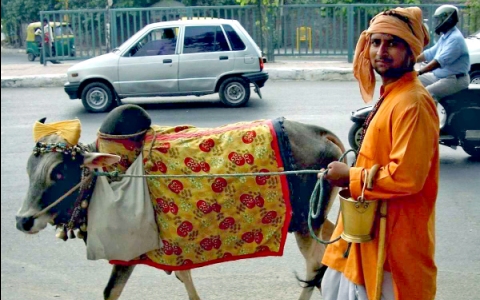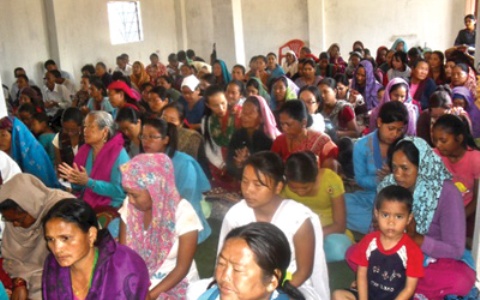Threat to sacred cows gets Nepalese fingers pointing at new converts
by - 9th July 2014

NEPAL'S HINDUS claim converts to other faiths are slaughtering their sacred cows.
Followers of the country’s main faith say proselytisation is to blame.
Hindu groups claim that Christians encourage new converts to disrespect Hindu symbols, which is causing anger and accusations of forced conversion in Nepal society. Figures show that Christianity is one of the fastest growing faiths in a country where more than 80 per cent of the population are Hindu.
A Hindu protest group called Vedic Sanatan Hindu Rastha Nepal recently brought cow slaughter to prominence by carrying out a hunger strike, which has just reached its eightieth day.
Anti-Hindu agenda
It was led by Hindu holy man Yuva Sant Shri Shrinevasacharya, who told Lapido Media: ‘Hindus, Hindu gurus, and other organisations should unite to fight against the growing number of crimes against our identity and culture.
‘We will no longer sit aside and watch as cows are slaughtered in this sacred land of our ancestors. We must strongly resist this anti-Hindu agenda. So far our protest has been peaceful, but if cow killing and conversion continues we will have to use other means.’
Hindu groups are linking cow slaughter to faith conversion – both are issues that many Hindus find unacceptable in a Hindu-majority country.
Intentionally killing a cow is punishable by up to 12 years in prison, but the law is rarely enforced.

According to official figures, over 81 per cent of Nepal’s 27 million people are Hindus. Buddhists are the largest minority with nine per cent, followed by Muslims (4.4 per cent) and Christians (1.4 per cent). Yet it is the rapid growth of Christianity – when contrasted with the declining numbers of Hindus – that is causing a major concern for Hindu leaders.
Between the two most recent censuses the Christian population has more than doubled: 180,000 in 2001 to 376,000 in 2011. Christian groups claim it is higher than 2.5m or approximately nine per cent of the population.
The number of churches in Nepal has grown substantially too. In one district, Banke, the number jumped from 10 to 40 since Nepal became a secular state in 2006.
Lured
Missionaries and Christian NGOs are repeatedly accused of luring poor non-Christians by promising them money and education.
Kamal Thapa, the leader of the Hindu nationalist party Rastriya Prajatantra Party Nepal (RPP-Nepal), has been vocal about the issue. He recently said that ‘US dollars are being poured into the country to lure an innocent Hindu population to convert to Christianity’. But, defiantly, he added that ‘Dollars cannot stop the country from reviving its lost identity.’
Yuva Sant Shri Shrinevasacharya insists that Christians, funded by aid agencies, are ‘helping to destroy the legacy of Hinduism in Nepal’.
By linking the issues of cow slaughter and proselytisation to the idea of sovereignty and cultural integrity the topic has become politically significant. The demand for the revival of Hinduism, and protection against proselytisation has further intensified after the Hindu nationalist Bhartiya Janta Party (BJP) dominated the recent Indian election.
A number of BJP leaders have expressed concerns about India’s secular status, as previously reported by Lapido Media.
According to media reports even Prime Minister Narendra Modi has warned Nepali Prime Minister Sushil Koirala to heed Nepal’s cultural integrity and legacy while writing the constitution. Previously, Rajnath Singh, Home Minister of India, had announced that he would like to see Nepal as a Hindu state.
In Nepali law an individual has the right to change their religion and practice the religion they wish, but, confusingly, it is prohibited to attempt to convert people.
Christian leaders claim that the state has not fully accepted secularism and continues to favor Hinduism. They also recount that Christians continue to face persecution in society. Last year, according to Barnabas Fund, a church building and the homes of four Christian converts were set on fire. In April this year Christians and other religious minorities were being asked to ‘reconsider their faith’ ahead of a new scheme requiring all Nepali citizens to register for an identity card.
The debate over cow slaughter and conversion has become symptomatic of the larger questions about Nepal’s cultural identity, the nature of secularism and Hindu revivalism. All of which have far reaching consequences for Nepal’s quest to become a multi-cultural and multi-religious state.
